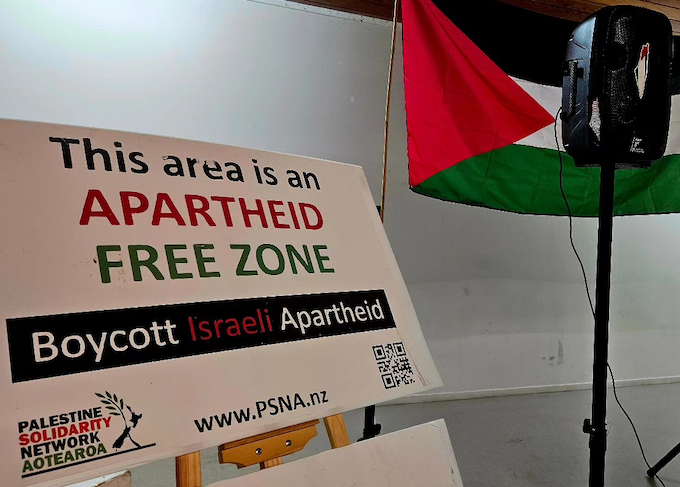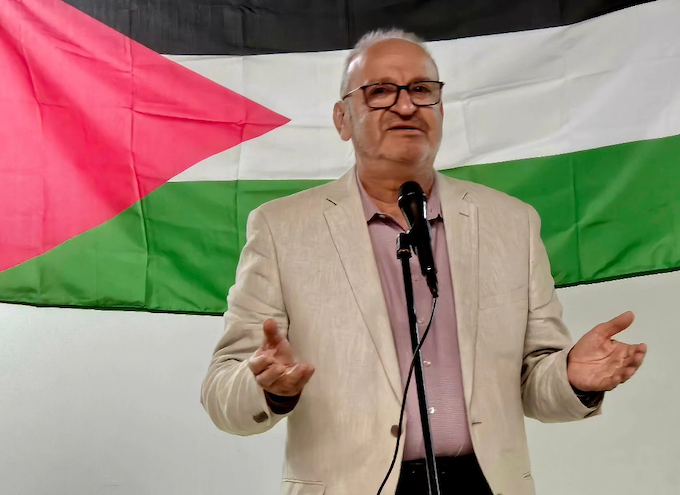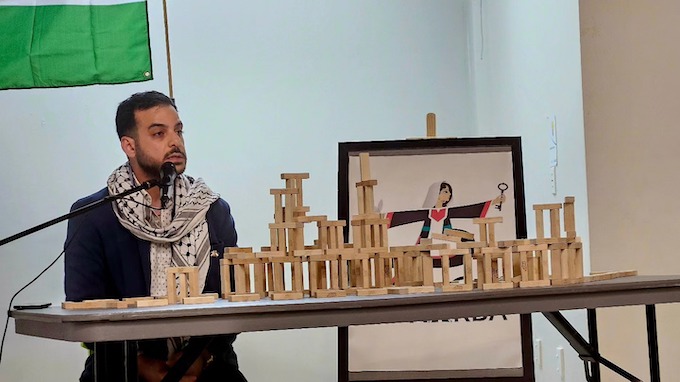
The Palestinian Ambassador to Australia, New Zealand and the Pacific, Dr Izzat Abdulhadi, last night appealed for “unity”, “strategy” and “networking” for the pathway forward to an independent state.
Responding to speculation about “the day after” when Israel’s genocidal war on Gaza is finally over at a community event in Auckland’s Western Springs Garden Community Hall, he condemned draconian Zionist Israeli “plans” for the Occupied Palestinian Territories without consultation.
It was up to Palestinians themselves to decide through a process of self-determination, he told a crowd of about 60 people.
- READ MORE: Israeli settler violence – Palestinians in the occupied West Bank targeted
- Other photos, videos from the public meeting

And he warned that reconstruction was a huge task with the United Nations indicating in a new report that 30 percent of the besieged enclave’s buildings and much of the infrastructure had been destroyed by Israel.
He said it could take up to 20 years to rebuild Gaza.
The United Nations Satellite Centre (UNOSAT) has reported: “In total, a staggering 69,147 structures, equivalent to approximately 30 percent of the Gaza Strip’s total structures, are affected.”
Dr Abdulhadi also criticised Australia for its “deeply disappointing and regrettable” decision to pause funding for the Palestine relief agency UNRWA. He had appealed to Canberra to restore the funding.
He also hoped that New Zealand would continue its UNRWA relief funding.
But first, the ambassador said, an immediate permanent ceasefire was urgently needed to cope with the humanitarian needs of the Gaza carnage.
Facilitator Samar Al Malalha highlighted the death toll of more than 27,000 civilians — mostly women and children — after 118 days, but warned people not to just “think numbers”.
He said they ought to empathise with each and every person and child — and sometimes entire families — who had been killed.
A poetic vision
Architect and poet Dr Sameh Daraghmeh presented a poetic vision of the Palestinian diaspora and tangata whenua.

Meanwhile, more than 800 European and American officials have signed a letter to their governments denouncing Israel’s war on Gaza as “one of the worst human catastrophes of this century”.
According to current and former officials spearheading or supporting the initiative, the letter marks the first time that officials from US and Israel ally nations across the Atlantic have united to publicly criticise their governments over the war.
The officials argue that they are speaking up because they, as civil servants, consider that it is their duty to help improve policy and to work in their nations’ interests, and that they are speaking up because they believe their governments need to change direction on the war.
“Our governments’ current policies weaken their moral standing and undermine their ability to stand up for freedom, justice and human rights globally,” the letter was quoted by The New York Times as saying.
‘Breathtakingly hypocritical’
There was a “plausible risk” that their governments’ policies were contributing to “grave violations of international humanitarian law, war crimes and even ethnic cleansing or genocide,” it added.
The document protected the identities of signers as they feared reprisal.
Al Jazeera senior political analyst Marwan Bisahara said it was an important step for civil service officials to join other dissenting segments of society in the West who have called for an end to the war.
“We are already in the fourth month of this war, which has killed so many people — children, old people, young people,” he said.
“The fact that they [letter signees] too are joining in . . . accumulates pressure on Western governments that have been breathtakingly hypocritical.”
Bishara also said the International Court of Justice’s ruling last month likely played a role in the crafting of the letter.
“I think once the court [ICJ] came out with its decision imposing six interim orders, it in many ways encouraged a lot of people to start speaking more and more for justice [in Gaza].”












































